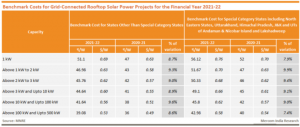The Ministry of New and Renewable Energy (MNRE) has issued benchmark costs for grid-connected rooftop solar photovoltaic (PV) systems for the financial year (FY) 2021-22.
The benchmark cost for FY 2021-22 is applicable for all projects to be awarded and for empanelment of vendors by state implementing agencies under phase-II of the MNRE’s rooftop solar program after ten days from the notification, i.e., August 28, 2021.
The benchmark cost covers solar photovoltaic (PV) modules (with domestic cells and modules) and inverter (single/3 phase).
These benchmark costs are important as the applicable subsidies for residential rooftop solar systems announced by MNRE will be calculated based on the benchmark costs determined for the specific years or the lowest cost quoted in a tender, whichever is lower.
It also includes the balance of system such as cable, switches, circuit breaker, connector, junction box, mounting structure, earthing, lightning arrester, civil works, installation and commissioning, comprehensive maintenance contract for five years, transportation, insurance, and taxes.
However, the benchmark costs exclude net metering costs and battery backup costs.
Benchmark costs for rooftop solar projects in states other than special category states for system capacities of 10 kW-100 kW is ?41.64 (~$0.56)/W. This is an increase of 9.6% compared to the benchmark costs determined in FY 2020-21.
 Benchmark costs have also been raised for special category states (Northeastern States, Uttarakhand, Himachal Pradesh, Jammu and Kashmir, and the Union Territories of Andaman and Nicobar). The MNRE set the cost for system capacities of 1kW to 2kW at 51.67 (~$0.70)/W, a 9.9% increase over the benchmark costs set in the previous year.
Benchmark costs have also been raised for special category states (Northeastern States, Uttarakhand, Himachal Pradesh, Jammu and Kashmir, and the Union Territories of Andaman and Nicobar). The MNRE set the cost for system capacities of 1kW to 2kW at 51.67 (~$0.70)/W, a 9.9% increase over the benchmark costs set in the previous year.
In FY 2020-21, for systems between 10-100 kW, the benchmark costs had been reduced to 38 (~$0.51)/W from the ?48 (~$0.70)/W in the previous year. The cost for system capacities of 100-500 kW was lowered by 20% when compared to the preceding year’s cost of 45 (~$0.66)/W.
The government has been keeping a close watch on the market movement and the rise in cost of components and commodities, which is reflected in its move to increase the benchmark costs this year.
In August last year, MNRE issued operational guidelines for implementing the second phase of its grid-connected rooftop solar program. Overall, 22 GW of rooftop solar PV projects is to be set up under the second phase of this program.
In January this year, MNRE issued a clarification for the second phase of its rooftop solar program under which distribution companies will invite expressions of interest for empaneling the agencies to supply, install, and commission rooftop solar systems in residential premises. It had clarified that all the bidders within the lowest bid price bracket would be empaneled and provide services to the consumers at the lowest agreed tariff rate.





